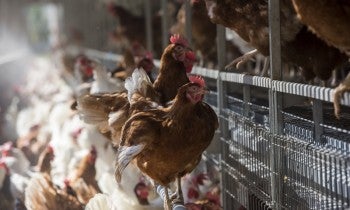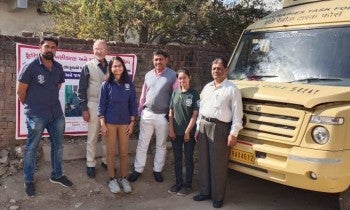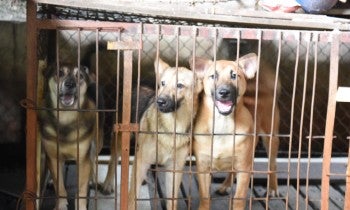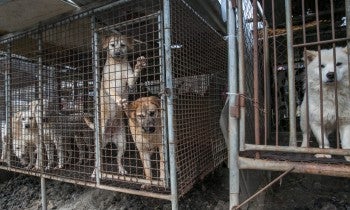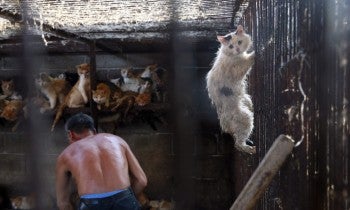Search
Found 4141 results
As UK debates hunting trophy import ban, Safari Club International’s annual convention promotes the senseless killing of wild animals for fun
LONDON — Thousands of trophy hunters from around the world will gather next week in Nevada, USA, for the world’s largest trophy hunt convention, held by Safari Club International, at which trophy hunter Donald Trump Jr. is also scheduled to speak. One of the hunts up for bid is a black-tailed deer
City Lodge Hotel Group becomes the first African hotel chain to announce a cage-free egg policy with HSI-Africa
South Africa — City Lodge Hotel Group (CLHG) has become the first African hotel chain to announce a cage-free eggs commitment, after working for two years with animal protection organisation Humane Society International to develop its animal welfare policy. By the end of 2025 CLHG will source
After legal loss, Trump Administration disbands illegal trophy hunting council
WASHINGTON -- After a key legal defeat, the Department of the Interior told a federal district court in New York late Friday that no future meetings of the International Wildlife Conservation Council (IWCC) will take place, bringing an end to the controversial council. Environmental and animal
An undercover investigation at the Safari Club International convention reveals the sale of potentially illegal wildlife products, captive-bred lion hunts and displays of thousands of products made from giraffes, elephants, stingrays, kangaroos and more
WASHINGTON — An undercover investigation last week by the Humane Society of the United States and Humane Society International exposed exhibitors peddling wild animal products at the Safari Club International convention in Reno, Nevada. Items found for sale include belts and boots made of elephants
As UK debates hunting trophy import and export ban, undercover investigation at the Safari Club International convention reveals sale of illegal wildlife products, captive-bred lion hunts and products made from giraffes, elephants, stingrays, kangaroos an
LONDON — As the UK government considers introducing a ban on hunting trophy imports and exports, an undercover investigation by Humane Society International and the Humane Society of the United States has exposed the sale of sickening pay-to-slay trips to kill iconic wild animals all over the world
Threatened African wildlife on offer at the Safari Club International convention as undercover investigation reveals sale of captive-bred lion hunts and products made from giraffes, elephants, rhinos, stingrays, kangaroos and more
SOUTH AFRICA — As animal protection organizations fight for the survival of many African wildlife species, an undercover investigation by Humane Society International and the Humane Society of the United States has exposed exhibitors peddling wild animal products and pay-to-slay trophy hunts at the
Community program “Abhay Sankalp” treats more than 100 street dogs in sterilization and anti-rabies vaccination drive held in Jamnagar
JAMNAGAR — Humane Society International/India, under its community driven program “Abhay Sankalp,” conducted its second two-week long sterilization and vaccination camp for street dogs in Gokul Nagar. The drive was supported by partner, MP Shah Family, and Municipal Commissioner Satish Patel
Actor and animal advocate Tricia Helfer urges Canada to “have a heart” in Valentine’s Day plea to ban cosmetic testing on animals
MONTREAL–This Valentine’s Day the Canadian government received a very special video message from actress Tricia Helfer ( Van Helsing, Lucifer) on behalf of Humane Society International and the #BeCrueltyFree Canada campaign, calling for a federal ban on cosmetic animal testing and trade. “As a proud
If it fails to support an end to wildlife markets, the World Health Organization would fail to protect human health
WASHINGTON (May 8, 2020)—The Associated Press is reporting that a scientist from the World Health Organization does not support closing live animal markets, such as the one in Wuhan, China, linked to COVID-19. The remarks were reportedly made by WHO food safety and animal diseases expert Peter Ben
UK tabloid story gets it wrong about South Africa and COVID-19
South Africa—Following publication of an online story in the UK’s Daily Express newspaper, published (11 May 2020), Humane Society International-Africa has released the following statement of clarification regarding the misleading nature of its headline and various quotes attributed to Audrey
VIDEO: Campaigners unite to urge governments across Asia to shut down dog & cat meat trades as ‘perfect breeding ground’ for next public health disaster
WASHINGTON—Animal protection groups from around the world have joined forces to urge governments across Asia to act urgently to permanently shut down unsanitary and brutal dog and cat meat markets and trades, amid growing global concern about zoonotic diseases and public health danger zones. Member
Over 70 dogs saved from slaughter as Humane Society International shuts down 16th South Korean dog meat farm
MONTREAL –More than 70 dogs found suffering by HSI on a hybrid dog meat farm and puppy mill in South Korea have been rescued and relocated to a temporary boarding facility in South Korea. Once safely off the farm, the dogs will immediately receive a full veterinary check-up and settle into their
Humane Society International procède à la fermeture de la 16e ferme de viande canine de Corée du Sud, permettant à plus de 70 chiens d’échapper à l’abattoir
MONTRÉAL—HSI a découvert plus de 70 chiens en souffrance en Corée du Sud dans un établissement hybride qui était à la fois une ferme de viande canine et une usine à chiot. Ils ont été sauvés et accueillis temporairement dans une pension pour chiens en Corée du Sud. Une fois en sécurité, les chiens
Nella Giornata Mondiale della Salute appello ai governi di tutto il mondo per intervenire sulle criticità del coronavirus e vietare il commercio di specie selvatiche per ridurre il rischio di future pandemie
ROMA/WASHINGTON–I governi di tutto il mondo hanno ricevuto oggi un appello urgente e un white paper scientifico da parte di Humane Society International per chiedere un'azione immediata volta a vietare il commercio, il trasporto e il consumo di animali selvatici - in particolare i mammiferi e gli
Zhuhai seconda città cinese a vietare il consumo di carne di cani, gatti e animali selvatici
ROMA/PECHINO—La città di Zhuhai, nella provincia del Guangdong, è diventata la seconda città della Cina continentale a vietare il consumo di carne di cani, gatti e fauna selvatica. Si tratta di un passo importante che gli attivisti della Humane Society International sperano darà inizio ad un vero e
Un no dell’Organizzazione Mondiale della Sanità alla chiusura dei mercati di fauna selvatica sarebbe un fallimento per la protezione della salute pubblica
ROMA/WASHINGTON—Secondo quanto diffuso dall’Associated Press, uno scienziato dell'Organizzazione Mondiale della Sanità non sosterrebbe la chiusura dei mercati di animali vivi, come quello di Wuhan, in Cina, collegato alla diffusione del COVID-19. Stando a quanto riferito, i commenti in questione
China’s wildlife farmers offered buy-out to grow plants instead of porcupines in COVID-19 crackdown
WASHINGTON—Wildlife farmers in two provinces in mainland China are being offered a government buy-out to facilitate a move away from breeding wild species for consumption, as part of the country’s crackdown on the wildlife trade in the wake of the COVID-19 pandemic. The plans, published on May 15 th
European Commission will start supporting plant-based diets in new Farm to Fork Strategy, but “chickened out” of removing EU funding for meat promotion
BRUSSELS—The European Commission will promote a shift to planet-friendly plant-based diets, according to its long-awaited Farm to Fork Strategy published today. As well as tackling climate impacts of food, reducing obesity rates and cancer prevention are cited as key health reasons why meat
Allevatore di cani da carne sudcoreano abbandona l’attività per coltivare ortaggi con l'aiuto e l'approccio pionieristico di Humane Society International
ROMA/SEOUL–Più di 70 cani sofferenti, trovati da Humane Society International in un allevamento di carne di cane della Corea del Sud, hanno avuto una seconda chance grazie alla decisione dell’allevatore di abbandonare l’attività. Dopo aver allevato cani per quasi 40 anni, Nakseon Kim ha colto al

